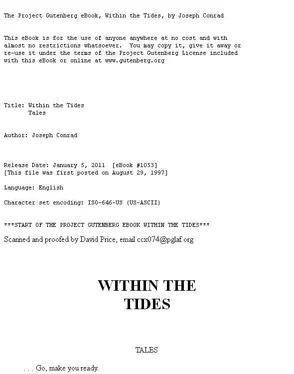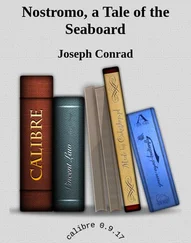Joseph Conrad - Within the Tides - Tales
Здесь есть возможность читать онлайн «Joseph Conrad - Within the Tides - Tales» весь текст электронной книги совершенно бесплатно (целиком полную версию без сокращений). В некоторых случаях можно слушать аудио, скачать через торрент в формате fb2 и присутствует краткое содержание. Год выпуска: 1997, Жанр: Старинная литература, на английском языке. Описание произведения, (предисловие) а так же отзывы посетителей доступны на портале библиотеки ЛибКат.
- Название:Within the Tides: Tales
- Автор:
- Жанр:
- Год:1997
- ISBN:нет данных
- Рейтинг книги:4 / 5. Голосов: 1
-
Избранное:Добавить в избранное
- Отзывы:
-
Ваша оценка:
- 80
- 1
- 2
- 3
- 4
- 5
Within the Tides: Tales: краткое содержание, описание и аннотация
Предлагаем к чтению аннотацию, описание, краткое содержание или предисловие (зависит от того, что написал сам автор книги «Within the Tides: Tales»). Если вы не нашли необходимую информацию о книге — напишите в комментариях, мы постараемся отыскать её.
are linked by Conrad's treatment of loyalty and betrayal. They range in setting from the Far East via eighteenth-century Spain to England. The tone shifts from the tragic inevitability of
and the pathos of
to the gothic
and the grim humour of
. The form of the stories was experimental but does not obscure Conrad's humanity or his search for moral truth.
Within the Tides: Tales — читать онлайн бесплатно полную книгу (весь текст) целиком
Ниже представлен текст книги, разбитый по страницам. Система сохранения места последней прочитанной страницы, позволяет с удобством читать онлайн бесплатно книгу «Within the Tides: Tales», без необходимости каждый раз заново искать на чём Вы остановились. Поставьте закладку, и сможете в любой момент перейти на страницу, на которой закончили чтение.
Интервал:
Закладка:
It was then that Byrne had his first glimpse of the little cloaked man in a yellow hat. Faded and dingy as it was, this covering for his head made him noticeable.
The entrance to the wine shop was like a rough hole in a wall of flints. The owner was the only person who was not in the street, for he came out from the darkness at the back where the inflated forms of wine skins hung on nails could be vaguely distinguished. He was a tall, one-eyed Asturian with scrubby, hollow cheeks; a grave expression of countenance contrasted enigmatically with the roaming restlessness of his solitary eye. On learning that the matter in hand was the sending on his way of that English mariner toward a certain Gonzales in the mountains, he closed his good eye for a moment as if in meditation. Then opened it, very lively again.
“Possibly, possibly. It could be done.”
A friendly murmur arose in the group in the doorway at the name of Gonzales, the local leader against the French. Inquiring as to the safety of the road Byrne was glad to learn that no troops of that nation had been seen in the neighbourhood for months. Not the smallest little detachment of these impious polizones . While giving these answers the owner of the wine-shop busied himself in drawing into an earthenware jug some wine which he set before the heretic English, pocketing with grave abstraction the small piece of money the officer threw upon the table in recognition of the unwritten law that none may enter a wine-shop without buying drink. His eye was in constant motion as if it were trying to do the work of the two; but when Byrne made inquiries as to the possibility of hiring a mule, it became immovably fixed in the direction of the door which was closely besieged by the curious. In front of them, just within the threshold, the little man in the large cloak and yellow hat had taken his stand. He was a diminutive person, a mere homunculus, Byrne describes him, in a ridiculously mysterious, yet assertive attitude, a corner of his cloak thrown cavalierly over his left shoulder, muffling his chin and mouth; while the broad-brimmed yellow hat hung on a corner of his square little head. He stood there taking snuff, repeatedly.
“A mule,” repeated the wine-seller, his eyes fixed on that quaint and snuffy figure. . . “No, señor officer! Decidedly no mule is to be got in this poor place.”
The coxswain, who stood by with the true sailor’s air of unconcern in strange surroundings, struck in quietly—
“If your honour will believe me Shank’s pony’s the best for this job. I would have to leave the beast somewhere, anyhow, since the captain has told me that half my way will be along paths fit only for goats.”
The diminutive man made a step forward, and speaking through the folds of the cloak which seemed to muffle a sarcastic intention—
“Si, señor. They are too honest in this village to have a single mule amongst them for your worship’s service. To that I can bear testimony. In these times it’s only rogues or very clever men who can manage to have mules or any other four-footed beasts and the wherewithal to keep them. But what this valiant mariner wants is a guide; and here, señor, behold my brother-in-law, Bernardino, wine-seller, and alcade of this most Christian and hospitable village, who will find you one.”
This, Mr. Byrne says in his relation, was the only thing to do. A youth in a ragged coat and goat-skin breeches was produced after some more talk. The English officer stood treat to the whole village, and while the peasants drank he and Cuba Tom took their departure accompanied by the guide. The diminutive man in the cloak had disappeared.
Byrne went along with the coxswain out of the village. He wanted to see him fairly on his way; and he would have gone a greater distance, if the seaman had not suggested respectfully the advisability of return so as not to keep the ship a moment longer than necessary so close in with the shore on such an unpromising looking morning. A wild gloomy sky hung over their heads when they took leave of each other, and their surroundings of rank bushes and stony fields were dreary.
“In four days’ time,” were Byrne’s last words, “the ship will stand in and send a boat on shore if the weather permits. If not you’ll have to make it out on shore the best you can till we come along to take you off.”
“Right you are, sir,” answered Tom, and strode on. Byrne watched him step out on a narrow path. In a thick pea-jacket with a pair of pistols in his belt, a cutlass by his side, and a stout cudgel in his hand, he looked a sturdy figure and well able to take care of himself. He turned round for a moment to wave his hand, giving to Byrne one more view of his honest bronzed face with bushy whiskers. The lad in goatskin breeches looking, Byrne says, like a faun or a young satyr leaping ahead, stopped to wait for him, and then went off at a bound. Both disappeared.
Byrne turned back. The hamlet was hidden in a fold of the ground, and the spot seemed the most lonely corner of the earth and as if accursed in its uninhabited desolate barrenness. Before he had walked many yards, there appeared very suddenly from behind a bush the muffled up diminutive Spaniard. Naturally Byrne stopped short.
The other made a mysterious gesture with a tiny hand peeping from under his cloak. His hat hung very much at the side of his head. “Señor,” he said without any preliminaries. “Caution! It is a positive fact that one-eyed Bernardino, my brother-in-law, has at this moment a mule in his stable. And why he who is not clever has a mule there? Because he is a rogue; a man without conscience. Because I had to give up the macho to him to secure for myself a roof to sleep under and a mouthful of olla to keep my soul in this insignificant body of mine. Yet, señor, it contains a heart many times bigger than the mean thing which beats in the breast of that brute connection of mine of which I am ashamed, though I opposed that marriage with all my power. Well, the misguided woman suffered enough. She had her purgatory on this earth—God rest her soul.”
Byrne says he was so astonished by the sudden appearance of that sprite-like being, and by the sardonic bitterness of the speech, that he was unable to disentangle the significant fact from what seemed but a piece of family history fired out at him without rhyme or reason. Not at first. He was confounded and at the same time he was impressed by the rapid forcible delivery, quite different from the frothy excited loquacity of an Italian. So he stared while the homunculus letting his cloak fall about him, aspired an immense quantity of snuff out of the hollow of his palm.
“A mule,” exclaimed Byrne seizing at last the real aspect of the discourse. “You say he has got a mule? That’s queer! Why did he refuse to let me have it?”
The diminutive Spaniard muffled himself up again with great dignity.
“ Quien sabe ,” he said coldly, with a shrug of his draped shoulders. “He is a great politico in everything he does. But one thing your worship may be certain of—that his intentions are always rascally. This husband of my defunta sister ought to have been married a long time ago to the widow with the wooden legs.” [188]
“I see. But remember that, whatever your motives, your worship countenanced him in this lie.”
The bright unhappy eyes on each side of a predatory nose confronted Byrne without wincing, while with that testiness which lurks so often at the bottom of Spanish dignity—
“No doubt the señor officer would not lose an ounce of blood if I were stuck under the fifth rib,” he retorted. “But what of this poor sinner here?” Then changing his tone. “Señor, by the necessities of the times I live here in exile, a Castilian and an old Christian, existing miserably in the midst of these brute Asturians, and dependent on the worst of them all, who has less conscience and scruples than a wolf. And being a man of intelligence I govern myself accordingly. Yet I can hardly contain my scorn. You have heard the way I spoke. A caballero of parts like your worship might have guessed that there was a cat in there.”
Читать дальшеИнтервал:
Закладка:
Похожие книги на «Within the Tides: Tales»
Представляем Вашему вниманию похожие книги на «Within the Tides: Tales» списком для выбора. Мы отобрали схожую по названию и смыслу литературу в надежде предоставить читателям больше вариантов отыскать новые, интересные, ещё непрочитанные произведения.
Обсуждение, отзывы о книге «Within the Tides: Tales» и просто собственные мнения читателей. Оставьте ваши комментарии, напишите, что Вы думаете о произведении, его смысле или главных героях. Укажите что конкретно понравилось, а что нет, и почему Вы так считаете.












